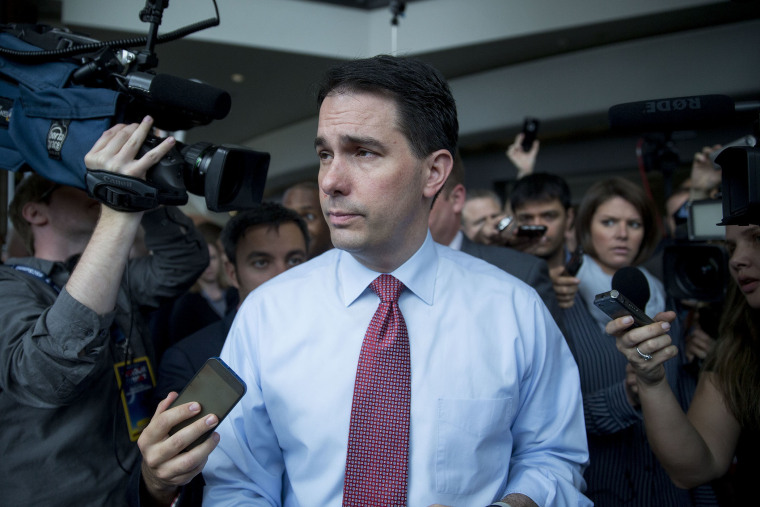If it takes a brave person to acknowledge what he or she does not know, Scott Walker has courage in abundance.
The Republican governor and presidential candidate was recently asked, for example, whether sexual orientation is a choice. "To me, that's, I don't know," Walker replied. "I don't know the answer to that question." Similarly, the far-right Wisconsinite isn't sure if President Obama loves the United States -- he told the AP in February, "I don't know" -- or even whether he believes modern biology.
In February, Walker was asked whether he believes President Obama is a Christian. "I don't know," the GOP governor replied. Over the weekend, he was asked again, and as the Washington Post reported, Walker is still uncertain.
Fielding questions at the Koch network's donor summit here Saturday night, the Republican presidential candidate reiterated the controversial position of uncertainty that he staked out in February. "You're not going to get a different answer than I said before," the Wisconsin governor said. "I don't know. I presume he is.... But I've never asked him about that. As someone who is a believer myself, I don't presume to know someone's beliefs about whether they follow Christ or not unless I've actually talked with them."
Walker did add that the president claims to be a Christian, and the governor is willing to "take him at his word." How gracious of him.
By Walker's reasoning, every presidential candidate's faith should be suspect, no matter how sincere, unless and until the Republican candidate has "actually talked with them" about matters of religion. As best as I can tell, Walker hasn't been asked about Jeb Bush's or Donald Trump's faith, but if he's consistent, he doesn't know whether to believe their professed Christianity, either.
Of course, if we take this a step further, should American voters be equally skeptical about Walker's faith? What's to stop Christian voters from hearing the governor claim to be a Christian, only to react by saying, "I presume he's a Christian, but I've never asked him about that. As someone who is a believer myself, I don't presume to know someone's beliefs about whether they follow Christ or not unless I've actually talked with them"?
As for whether or not Walker's broad skepticism matters in the presidential campaign, I continue to think it does. Following up on our discussion from February, candidates face small leadership tests throughout national campaigns, and how candidates respond tells us something important about their character.
Earlier this year, for example, Rudy Giuliani spouted some ignorant nonsense about the president at a Walker event. The Wisconsin Republican knew he'd face questions about Giuliani's comments, and Walker had an opportunity to criticize -- or at least distance himself from -- the former mayor's ugly attacks.
Walker refused. It was an opportunity for leadership, and the governor passed.
In the weeks and months that followed, the limits of Walker's worldview have grown murky. He won’t say whether he accepts modern biology. He won’t say whether Obama loves America. He won’t say whether the Christian president is a Christian. He has a record of repeatedly dodging simple, straightforward questions, which most political leaders are able to answer effortlessly.
It may be debatable whether these are good questions. It’s not debatable that Walker has provided cringe-worthy answers.
I can appreciate why the governor’s rhetoric may seem irrelevant compared to issues like the economy and national security, but in any race for national office, the public gets to know candidates pretty well. It’s not unreasonable for Americans to wonder, “Is a presidential candidate a crackpot? Does he pander to extremists? Is he capable of intelligent answers to simple questions? Does he have a spine?”
The governor is in the process of introducing himself to the nation. A series of "I don't know" answers to simple questions may satisfy the GOP's far-right base, but for the American mainstream, it's hardly the basis for a positive impression.
